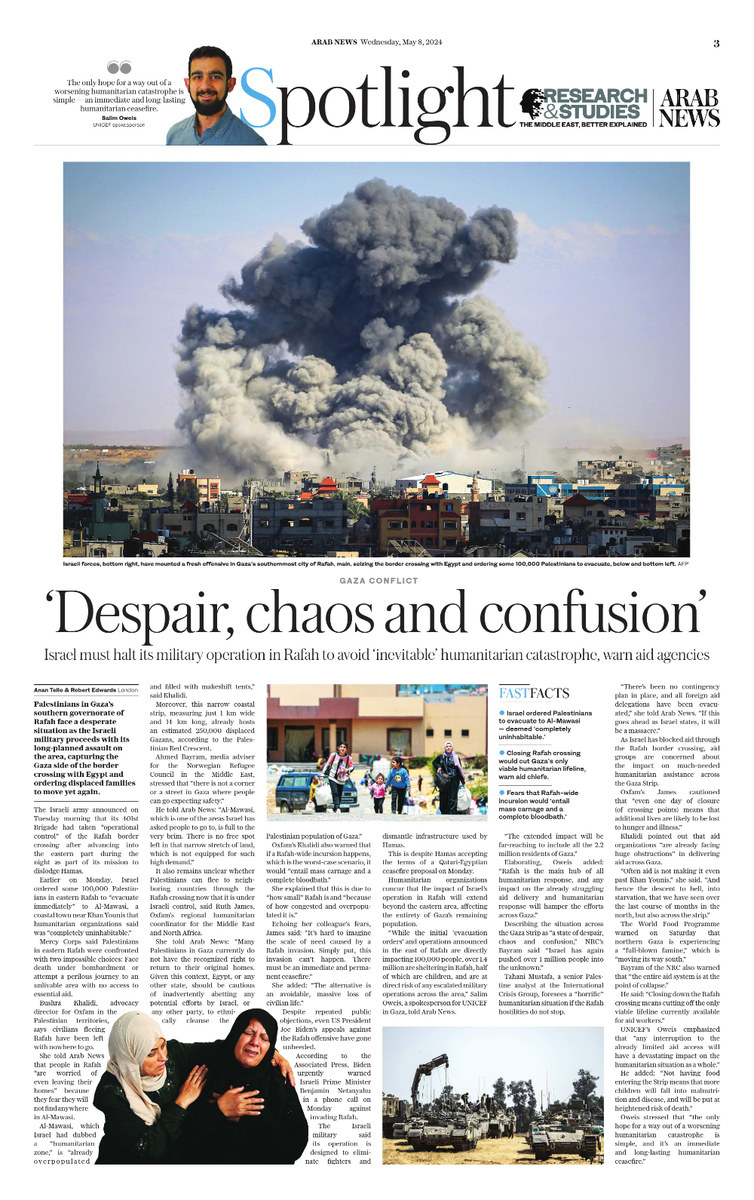LONDON: Palestinians in Gaza’s southern governorate of Rafah face a desperate situation as the Israeli military proceeds with its long-planned assault on the area, capturing the Gaza side of the border crossing with Egypt and ordering displaced families to move yet again.
The Israeli army announced on Tuesday morning that its 401st Brigade had taken “operational control” of the Rafah border crossing after advancing into the eastern part during the night as part of its mission to dislodge Hamas.
Earlier on Monday, Israel ordered some 100,000 Palestinians in eastern Rafah to “evacuate immediately” to Al-Mawasi, a coastal town near Khan Younis that humanitarian organizations said was “completely uninhabitable.”
Mercy Corps said Palestinians in eastern Rafah were confronted with two impossible choices: Face death under bombardment or attempt a perilous journey to an unlivable area with no access to essential aid.

Smoke billows after Israeli bombardment in Rafah. (AFP)
Bushra Khalidi, advocacy director for Oxfam in the Palestinian territories, says civilians fleeing Rafah have been left with nowhere to go.
She told Arab News that people in Rafah “are worried of even leaving their homes” because they fear they will not find anywhere in the middle area or in Al-Mawasi.
According to the AFP news agency, more than 74 percent of the infrastructure in Gaza has been destroyed since Oct. 7 when Israel launched its bombing campaign in retaliation for the Hamas-led attack on southern Israel.
Al-Mawasi, which Israel had dubbed a “humanitarian zone,” is “already overpopulated and filled with makeshift tents,” said Khalidi. “There is no infrastructure, there (are) no services, and no facilities to host this number of (internally displaced people).”
Moreover, this narrow coastal strip, measuring just 1 km wide and 14 km long, already hosts an estimated 250,000 displaced Gazans, according to the Palestinian Red Crescent.
Ahmed Bayram, media adviser for the Norwegian Refugee Council in the Middle East, stressed that “there is not a corner or a street in Gaza where people can go expecting safety.”
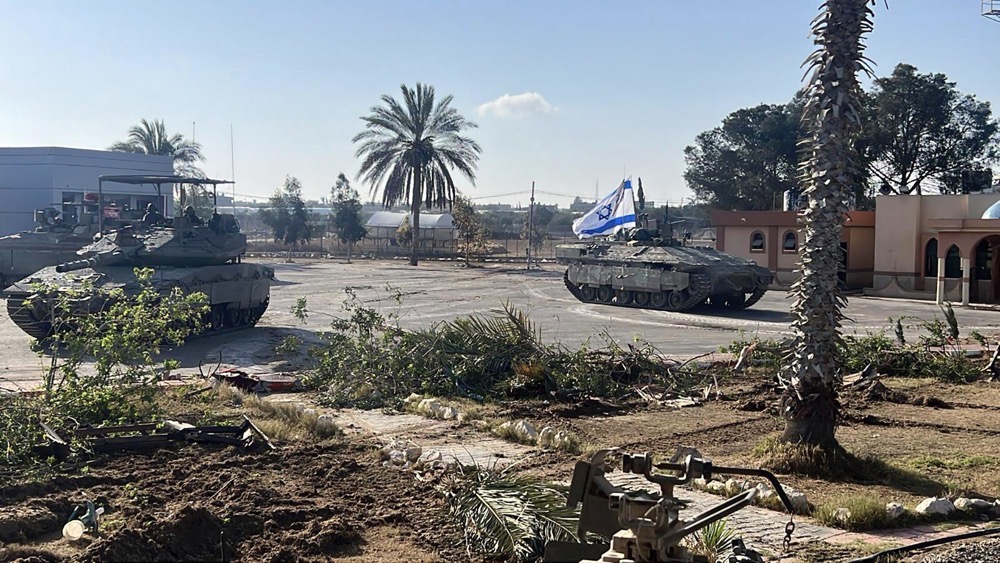
Israeli tanks enter the Gazan side of the Rafah border crossing on Tuesday, May 7, 2024. (AP/Israeli Army)
He told Arab News: “Al-Mawasi, which is one of the areas Israel has asked people to go to, is full to the very brim. There is no free spot left in that narrow stretch of land, which is not equipped for such high demand.”
According to Mercy Corps, Al-Mawasi is already a sea of makeshift tents, with little in the way of humanitarian relief, electricity, or water.
It also remains unclear whether Palestinians can flee to neighboring countries through the Rafah crossing now that it is under Israeli control, said Ruth James, Oxfam’s regional humanitarian coordinator for the Middle East and North Africa.
She told Arab News: “Many Palestinians in Gaza currently do not have the recognized right to return to their original homes. Given this context, Egypt, or any other state, should be cautious of inadvertently abetting any potential efforts by Israel, or any other party, to ethnically cleanse the Palestinian population of Gaza.”
Volker Turk, the UN human rights chief, slammed Israel’s evacuation order as “inhumane,” warning that such an action could amount to a war crime, Reuters reported.
Oxfam’s Khalidi also warned that if a Rafah-wide incursion happens, which is the worst-case scenario, it would “entail mass carnage and a complete bloodbath.”
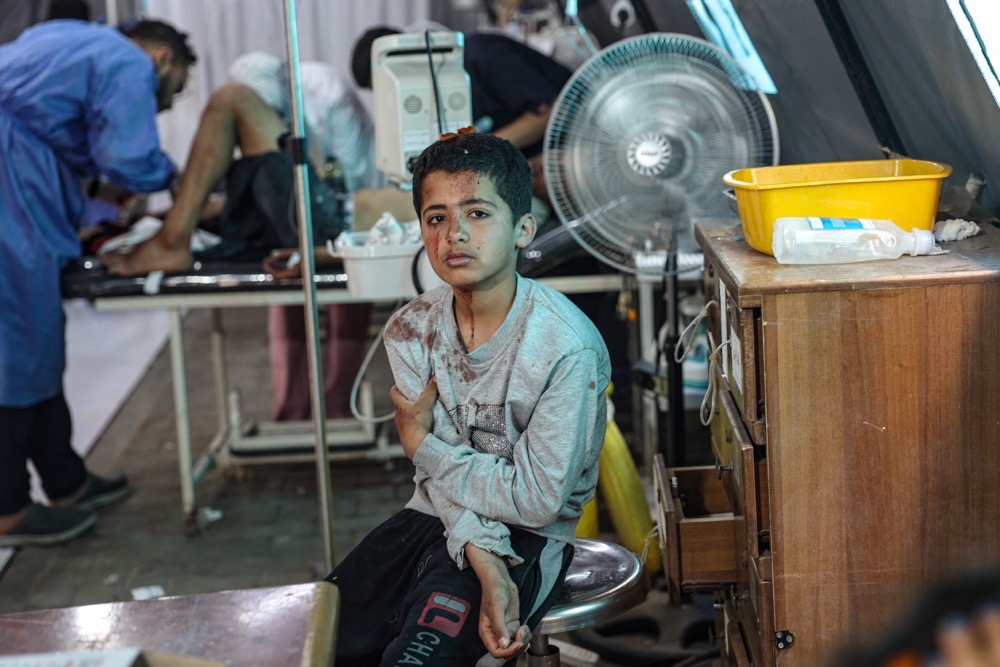
An injured Palestinian boy awaits treatment at the Kuwaiti hospital following Israeli strikes in Rafah. (AFP)
She explained that this is due to “how small” Rafah is and “because of how congested and overpopulated it is.”
Echoing her colleague’s fears, James said: “It’s hard to imagine the scale of need caused by a Rafah invasion. Simply put, this invasion can’t happen. There must be an immediate and permanent ceasefire.”
She added: “The alternative is an avoidable, massive loss of civilian life.”
Despite repeated public objections, even US President Joe Biden’s appeals against the Rafah offensive have gone unheeded.
According to the Associated Press, Biden urgently warned Israeli Prime Minister Benjamin Netanyahu in a phone call on Monday against invading Rafah, stressing it would only lead to more deaths and exacerbate the despair in the embattled enclave.
The Israeli military said its operation in Rafah is designed to eliminate fighters and dismantle infrastructure used by Hamas, according to Reuters.
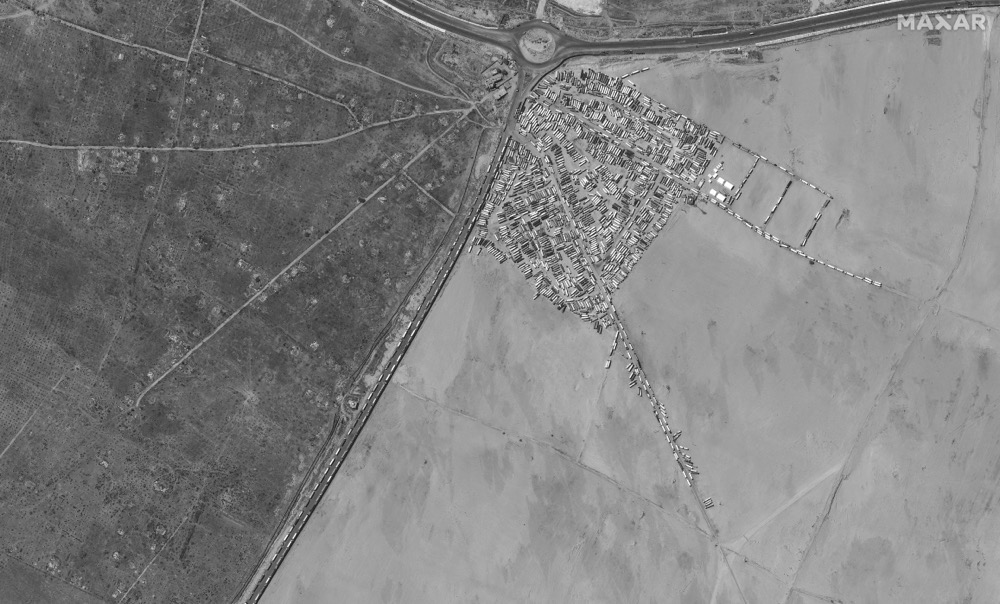
An aerial view of cargo trucks relocated away from the Rafah border crossing with Egypt. (Maxar Technologies)
Israel’s overnight strikes across Rafah killed at least 23 people, including five children, according to local health officials.
Prior to that, Israeli warplanes pounded homes in Rafah, killing at least 27 Palestinians, including two babies, according to Gaza’s health authority.
This is despite Hamas accepting the terms of a Qatari-Egyptian ceasefire proposal on Monday.
Humanitarian organizations concur that the impact of Israel’s operation in Rafah will extend beyond the eastern area, affecting more than 1.4 million people who have been sheltering in the southern governorate — and the entirety of Gaza’s remaining population.
“While the initial ‘evacuation orders’ and operations announced in the east of Rafah are directly impacting 100,000 people, over 1.4 million are sheltering in Rafah, half of which are children, and are at direct risk of any escalated military operations across the area,” Salim Oweis, a spokesperson for UNICEF in Gaza, told Arab News.
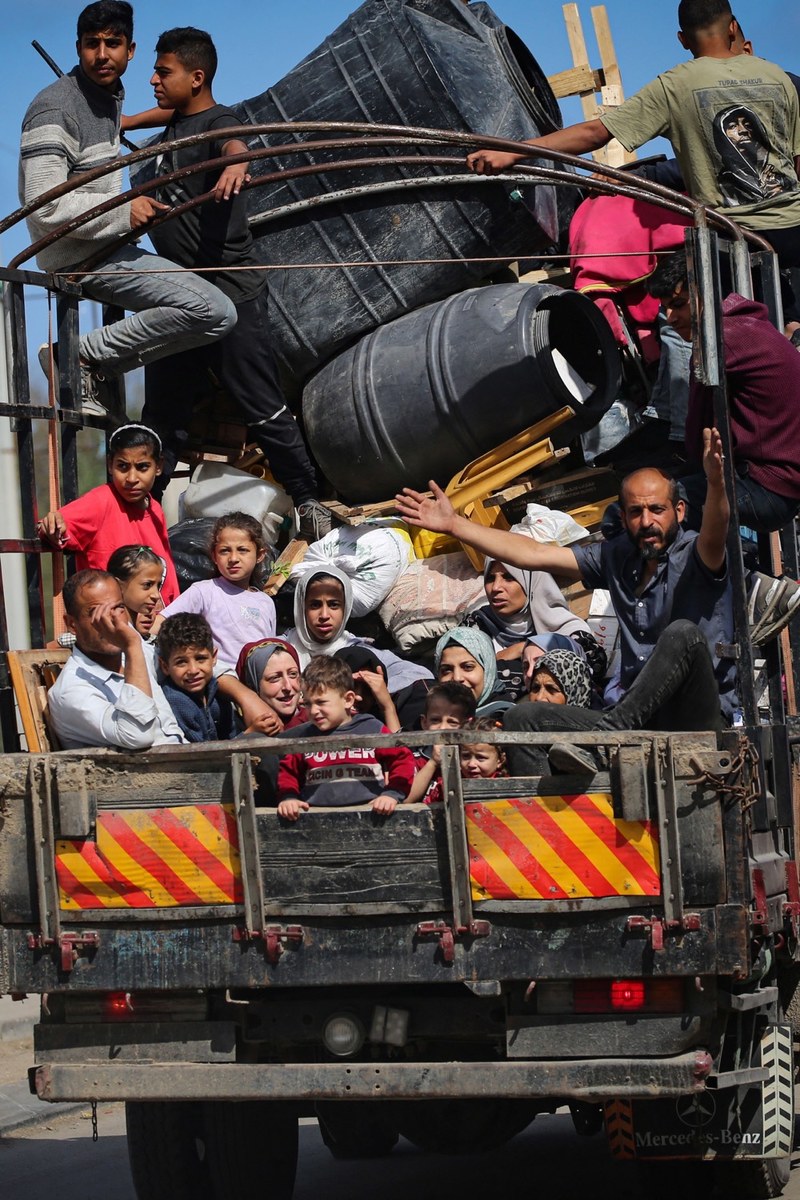
Displaced Palestinians flee Rafah for safer areas in southern Gaza. (AFP)
“The extended impact will be far-reaching to include all the 2.2 million residents of Gaza.”
Elaborating, Oweis added: “Rafah is the main hub of all humanitarian response, and any impact on the already struggling aid delivery and humanitarian response will hamper the efforts across Gaza.”
Rafah is the last population center in the Gaza Strip after the seven-month Israeli assault obliterated three-quarters of the besieged enclave, killing at least 34,700 Palestinians according to Gaza’s health ministry, and displacing 90 percent of the population of 2.3 million people.
Israel’s evacuation orders in eastern Rafah, coupled with unceasing airstrikes across Gaza’s south, have instilled panic among the war-weary residents, triggering an exodus of thousands of Palestinians who have nowhere to seek refuge.
Describing the situation across the Gaza Strip as “a state of despair, chaos and confusion” as Israel carries out its assault on Rafah, NRC’s Bayram said that “by issuing its orders, Israel has again pushed over 1 million people into the unknown.”
FASTFACTS
• Israel ordered Palestinians to evacuate to Al-Mawasi — deemed ‘completely uninhabitable.’
• Closing Rafah crossing would cut Gaza’s only viable humanitarian lifeline, warn aid chiefs.
• Fears that Rafah-wide incursion would ‘entail mass carnage and a complete bloodbath.’
He added: “Let’s not forget, while the orders cover an area with 100,000 people east of Rafah, the rest of the population in central and western areas will think they are next to be forcibly transferred, and so they will try to get out while they can.”
Tahani Mustafa, a senior Palestine analyst at the International Crisis Group, foresees a “horrific” humanitarian situation if the Rafah hostilities do not stop.
“All movement of people and goods has been closed off, at a time where famine is already in the north and was very much on the verge in the south,” she told Arab News.
“There’s been no contingency plan in place, and all foreign aid delegations have been evacuated. If this goes ahead as Israel states, it will be a massacre.”
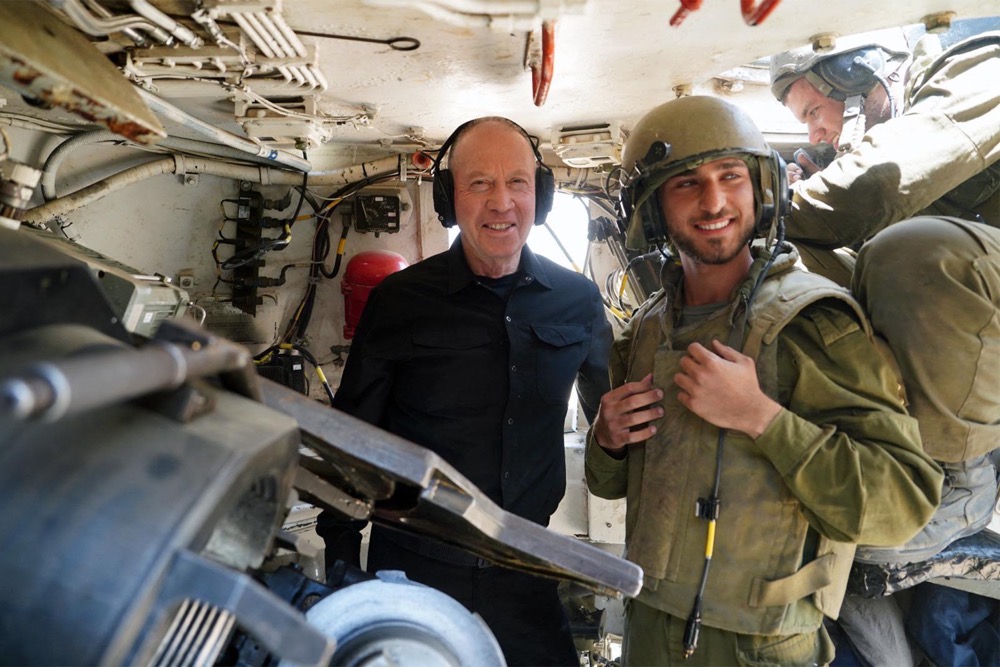
Gallant promised to “deepen” the Rafah operation if hostage deal talks failed. (AFP)
As Israel has blocked aid through the Rafah border crossing, aid groups are concerned about the impact on much-needed humanitarian assistance across the Gaza Strip. This concern is exacerbated by the suspension of aid deliveries to Gaza through the Kerem Shalom crossing following a nearby Hamas rocket attack.
Oxfam’s James cautioned that “even one day of closure (of crossing points) means that additional lives are likely to be lost to hunger and illness.”
She called on Israel to “adhere to its obligations under international humanitarian law to ensure civilian populations are provided with the most essential aid in sufficient quantities.”
Khalidi pointed out that aid organizations “are already facing huge obstructions” in delivering aid across Gaza.
Opinion
This section contains relevant reference points, placed in (Opinion field)
“Often aid is not making it even past Khan Younis,” she said. “And hence the descent to hell, into starvation, that we have seen over the last course of months in the north, but also across the strip.”
Stressing the need to open “all crossings” to meet the immense and deep humanitarian needs in Gaza, Khalidi said: “We’re hearing that maybe other crossings will open, but the problem is that we already had two crossings open, and that was not enough.”

Displaced Palestinians arrive in Khan Yunis after Israel issued an evacuation order for parts of Rafah. (AFP)
The World Food Programme warned on Saturday that northern Gaza is experiencing a “full-blown famine,” which is “moving its way south.”
Bayram of the NRC also warned that “the entire aid system is at the point of collapse.”
He said: “Closing down the Rafah crossing means cutting off the only viable lifeline currently available for aid workers,” highlighting that the NRC relies on the Rafah crossing to bring in essential aid.
“Fuel is running low already and the existing stocks will not be able to sustain increasing demand,” he added, stressing that “Israel must reverse its plans so we can avoid an inevitable catastrophe.”
UNICEF’s Oweis emphasized that “any interruption to the already limited aid access will have a devastating impact on the humanitarian situation as a whole.”
He added: “With no fuel coming in, all the basic services will be in jeopardy of a total halt, including aid delivery and what’s left of healthcare.
“Not having food entering the strip means that more children will fall into malnutrition and disease, and will be put at heightened risk of death.”

A woman mourns a child killed by Israeli strikes on Rafah. (AFP)
Gaza’s health authority reported on April 25 that since February, at least 28 children, most of them no older than 12 months, had died of malnutrition and dehydration.
Oweis stressed that “the only hope for a way out of a worsening humanitarian catastrophe is simple, and it’s an immediate and long-lasting humanitarian ceasefire.”
He added: “Meanwhile, safe and consistent access for humanitarian organizations and personnel to reach children and their families with lifesaving aid, wherever they are in the Gaza Strip, is crucial.”
